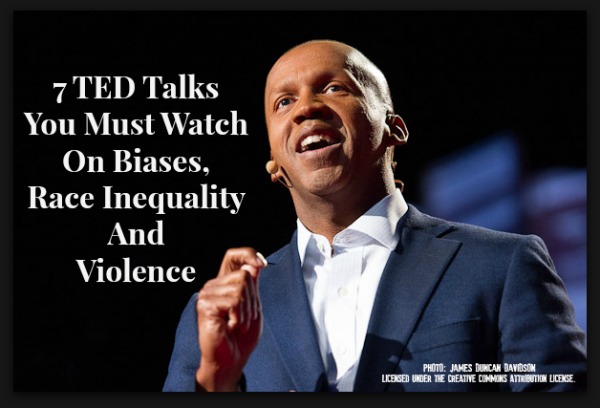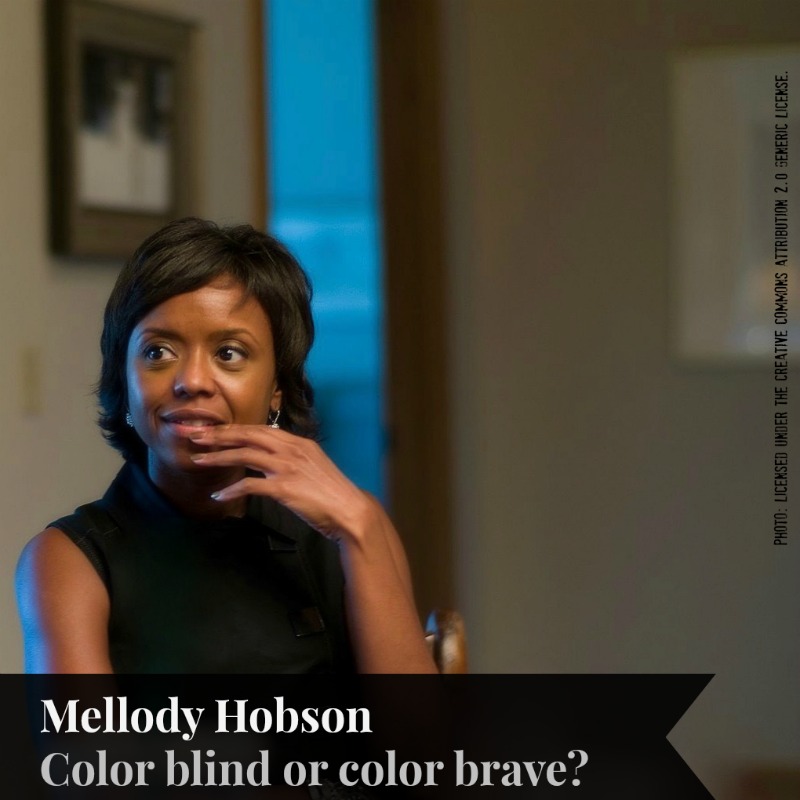
Photo: James Duncan Davidson
As I was looking at old photos the other night, memories of my teenage years in Santo Domingo flooded my mind. I began thinking about my late aunt, Anairis, who probably never realized the profound impact she had on my life. She always told me that I was a natural leader, and those words, as we know, are powerful. Having different perspectives on biases, racial inequality, and violence can shape the way we view these crucial issues.
That’s why I love TED. It provides a platform to discuss important topics and broadcast those messages to the masses while being inspirational in a diverse and multicultural environment. I particularly enjoy talks that address diversity, inclusion, and multiculturalism. I love that these topics are discussed from various perspectives and levels of expertise.
Reflecting on my late aunt, Tía Anairis, and her always encouraging words, I know they have influenced the work I’ve chosen to do. That’s why I believe it is crucial for each of us to seek opportunities to hear diverse voices about the issues our society faces.
When it comes to biases, racial inequality, and violence, the need for conversations and inspiration couldn’t be greater. In a time when we witness so much negativity and many fear the future due to demographic changes, it is essential to highlight those who show communities of color in a different light and address the challenges these communities face.
As a TED fan, I have curated a list of talks that address biases, racial inequality, and violence that I think everyone should watch to better understand the reality we live in today. I firmly believe that through awareness and a shared commitment to recognize each other’s humanity, we can achieve harmony and continue to progress as a society.

If you’re not as hooked on TED as I am (yet!) or perhaps have missed some of these incredible talks, I’ve done the legwork for you. Here’s a list of TED talks you must watch about biases, racial inequality, and violence in the United States. They present different facts, stories, and perspectives that encourage us to examine our own biases, overcome them, embrace diversity, and move towards an inclusive society.
These talks will prompt you to think about injustice, racial tensions, and standing up for yourself; they may even make you laugh or relive your own childhood memories of people who encouraged and inspired you. Moreover, these talks will show that when we focus on our shared humanity and allow ourselves to see others as we see our families and friends, we will be unstoppable in our growth, experience true freedom, and live in peace.
Bryan Stevenson: We need to talk about an injustice
This is my first pick because it’s my favorite on this list. Bryan Stevenson is a human rights attorney who spends most of his time in prisons with death row convicts, painting a stark picture of the unfair and unjust American justice system. What I loved most about his talk was how he spoke about the influence his grandmother had on him and how it shaped who he is today. Stevenson is an eloquent speaker who makes a compelling argument about the significant racial disparities in the incarceration rates of Black and Latino people. This talk will make you think about the moral dilemma of the death penalty, and it will also make you laugh and feel inspired!
fighting poverty and challenging racial discrimination in the criminal justice system.
Vernã Myers: How to overcome our biases?
This talk is my second choice because it invites everyone to reflect on the biases we hold toward people, regardless of who we are. Myers demonstrates how dangerous these biases can be when they spread and become ingrained as unwritten rules. By acknowledging our biases, she suggests—and I agree—we can move from feeling uncomfortable with certain people and topics to better understanding them and eventually overcoming those biases. Myers is compelling, funny, and candid. She clearly cares about a diverse society and has encountered some of these biases herself. I loved her call to action and appreciated how she shows the potential for human compassion.
in order to actively combat them, emphasizing a “low guilt, high responsibility” philosophy.
Sanford Biggers: An artist’s unflinching look at racial violence
This talk is incredibly powerful and a testament to the fact that art is one of the most authentic and radical forms of human expression. Biggers exposes us to the violence faced by Black Americans and makes us feel part of it in a direct and compelling way. Prepare for an intense five minutes of our racial reality, portrayed through sculptures created to ignite dialogue. Biggers mentions how people often avoid discussing slavery and racial tensions, and emphasizes the need to do so thoughtfully. Through his creations, Biggers pushes us to have the difficult conversations we must have at this moment in time, analyzing with candor the history of social injustice experienced by Black America. This talk is tough, tragic, and beautiful all at the same time.
Buddhism to American history. Biggers is Assistant Professor at Columbia University’s Visual Arts program.
Yassmin Abdel-Magied: What does my headscarf mean to you?
Perception is reality, or so we’ve heard. But what happens when our perception stems from prejudice, a bias planted in our minds at some point in our lives? I loved this talk because it directly confronts some of our biases through a simple change of outfit and a quick story about an accident. Abdel-Magied shows how our brains are often wired in a certain way by society or life experiences, and it’s up to us to recognize and change that. Going beyond our initial thoughts and prejudices is not difficult, but it requires a willingness to confront ourselves and acknowledge the barriers we’ve built. She is funny, relatable, and candid, making you feel like she could be your sister or daughter—or at least, someone you’d want to know.
Safwat Saleem: Why I keep speaking up, even when people mock my accent
I know I keep saying how much I love each of these talks, but it’s true. I connected with these stories on different levels, which is why they made it to this list. In this case, in particular, I relate to Saleem’s story. While I didn’t grow up with a stutter—in fact, I’m known for talking too much—I did face challenges when I moved to the United States and had to use my second language, which I learned when I was 20 years old. As you may know, having an accent is often seen as synonymous with being less intelligent, less educated, or inferior.
I love that this artist decided to reclaim his voice, not only through his animations but also by standing on a stage like TED’s to discuss issues like bullying and the notion of what’s “normal.” He argues that the standards of what’s “normal” depend on how well one fits into others’ expectations. This talk is thought-provoking and another way to recognize that what we think we know for sure might not be so.
for making politically charged satirical art. Safwat’s artwork has used a variety of media, including illustration,
writing, animation, audio, film and sculpture.
Mellody Hobson: Color blind or color brave?
For someone like me, talking about race, color, diversity, and discrimination is a constant part of my life. Unfortunately, this isn’t the norm for most people in America, and we’re paying a devastating price as a society for avoiding discussions about race and race relations. Mellody Hobson challenges us to be bold, to have the courage to be “color brave” and to show the children of today that they can dream big and be welcomed wherever they choose to go in life. Hobson encourages the audience to initiate conversations about race, learn to be uncomfortable, and eventually become comfortable with diversity. She argues that diversity isn’t just the right thing to do—it’s also the best business practice.
for financial literacy and investor education. Beyond her work at Ariel, Hobson has become a nationally recognized
voice on financial literacy and investor education.
Rich Benjamin: My road trip through the whitest towns in America
Rich Benjamin’s talk is both funny and insightful as he shares his two-year journey through the whitest towns in the United States. I saved this one for last because it addresses a significant social phenomenon with humor. Through his experience, he highlights the trend of people moving to what he calls a “Whitopia”—pleasant, safe communities, usually rooted in a middle-to-upper-class environment, where comfort, beauty, and nice neighbors often equate to segregated communities. Follow Benjamin’s journey as a Black man in Whitopia, laugh at his anecdotes, and then confront the reality that suggests we may be moving backward as a country.
I hope you enjoy these talks as much as I did. I’d love to hear what you think: How did they move you? What did you learn? How are you different after watching?
Leave a Reply